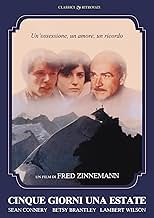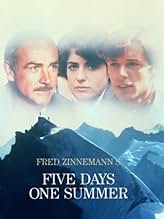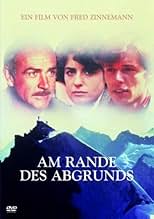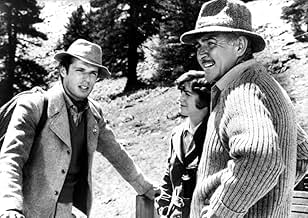CALIFICACIÓN DE IMDb
6.1/10
1.4 k
TU CALIFICACIÓN
La historia cautivadora de un amor incestuoso ambientado en los Alpes suizos.La historia cautivadora de un amor incestuoso ambientado en los Alpes suizos.La historia cautivadora de un amor incestuoso ambientado en los Alpes suizos.
- Dirección
- Guionistas
- Elenco
Jerry Brouer
- Van Royen
- (as Jerry Brouwer)
- Dirección
- Guionistas
- Todo el elenco y el equipo
- Producción, taquilla y más en IMDbPro
Opiniones destacadas
The good points - beautiful scenery, and some viewers might appreciate the insight into mountain climbing in the 1930's.
Bad points - the flashbacks are tedious, the ending obvious (to this viewer anyway)and - apart from Connery, who plays himself, as always - the acting uninvolving. And personally I don't care much about mountaineering in the 1930's, and this film didn't do anything to quicken my interest.
There are some surprises, but I feel the movie really lacks from characters whom one can care about: in particular Betsy Brantley, who plays Kate, seems desperately out of her depth here.
I found it to be pretentious and glacially slow. I'd rather have that ninety minutes of my life back.
Bad points - the flashbacks are tedious, the ending obvious (to this viewer anyway)and - apart from Connery, who plays himself, as always - the acting uninvolving. And personally I don't care much about mountaineering in the 1930's, and this film didn't do anything to quicken my interest.
There are some surprises, but I feel the movie really lacks from characters whom one can care about: in particular Betsy Brantley, who plays Kate, seems desperately out of her depth here.
I found it to be pretentious and glacially slow. I'd rather have that ninety minutes of my life back.
10dusted1
This is a very fine movie. Maltin really misses it with his review. Fine acting by all of the major players. As at least one other reviewer pointed out, this is a finely crafted, minimalist production as far as the character dialogue. Zinnemann did a superb job of direction. The alpine scenes are exquisitely beautiful. The mountain climbing is realistically of the period (1932) and I found it to be completely engrossing.
The film is a morality play about the nature and reality of boundaries. And what type of tragedy can happen when one ignores boundaries. Beautifully done film. If you like real stories about real people you should love this film. If you're a special effects type of guy you might want to ignore it. Still, the cinemaphotography and mountain climbing scenes are worth a look--even for the most jaded modernist.
The film is a morality play about the nature and reality of boundaries. And what type of tragedy can happen when one ignores boundaries. Beautifully done film. If you like real stories about real people you should love this film. If you're a special effects type of guy you might want to ignore it. Still, the cinemaphotography and mountain climbing scenes are worth a look--even for the most jaded modernist.
This final Fred Zinnemann film was pretty much trashed by the critics when it came out in 1983 which is puzzling, in my opinion. I mean, it's certainly not a great or even very good film but it's just as good or better than a lot of the stuff DePalma was churning out at the same time over which the same critics swooned. Of course, by 1983 Zinnemann was long out of favor with the auteurists who dominated film criticism, having been consigned to the realm of "impersonality" by their hero and mentor, Andrew Sarris who, as usual, confused moral earnestness and craftsmanship with anonymity, as if Zinnemann were no better than, say, Robert Z. Leonard. Or Delbert Mann.
So let me do my small part to mildly rehabilitate this sad tale of a love affair crumbling amid the Alps that could have been told by Hemingway, Irwin Shaw or James Salter. Problem is that scenarist Michael Austin is considerably less talented than those three scribes and makes the fatal mistake, I'm sure with Zinnemann's input, of having the affair be between uncle and niece, thus giving the proceedings an un-needed "yuck!" factor when the story could have worked just as easily or better as older man/younger woman.
If, however, you can overlook the above failing (a tall ask, judging by the IMDB responses below) there are many things that are appealing in this good director's swan song, including fine performances by the three leads, especially the too seldom seen Betsy Brantley who imbues her character with poignancy, intelligence and grace. I also liked the story within the story of the old woman who gazes upon the perfectly ice-preserved body of the handsome young man she was to marry forty years ago. A lot of film makers would have stuck this in awkwardly as a clunky, moralistic sub plot. Not Zinnemann. In his hands it is woven seamlessly into the movie's fabric and does not hit you over the head with "message" about true versus false love.
Then there is the lovely score by Elmer Bernstein, and the even lovelier cinematography of Giuseppe Rotunno.
Bottom line: Sarris was wrong about Huston and Wilder. I maintain he's almost as wrong about Zinnemann. Give it a B minus.
So let me do my small part to mildly rehabilitate this sad tale of a love affair crumbling amid the Alps that could have been told by Hemingway, Irwin Shaw or James Salter. Problem is that scenarist Michael Austin is considerably less talented than those three scribes and makes the fatal mistake, I'm sure with Zinnemann's input, of having the affair be between uncle and niece, thus giving the proceedings an un-needed "yuck!" factor when the story could have worked just as easily or better as older man/younger woman.
If, however, you can overlook the above failing (a tall ask, judging by the IMDB responses below) there are many things that are appealing in this good director's swan song, including fine performances by the three leads, especially the too seldom seen Betsy Brantley who imbues her character with poignancy, intelligence and grace. I also liked the story within the story of the old woman who gazes upon the perfectly ice-preserved body of the handsome young man she was to marry forty years ago. A lot of film makers would have stuck this in awkwardly as a clunky, moralistic sub plot. Not Zinnemann. In his hands it is woven seamlessly into the movie's fabric and does not hit you over the head with "message" about true versus false love.
Then there is the lovely score by Elmer Bernstein, and the even lovelier cinematography of Giuseppe Rotunno.
Bottom line: Sarris was wrong about Huston and Wilder. I maintain he's almost as wrong about Zinnemann. Give it a B minus.
I'm one of those who think this film is a neglected gem.
It has a number of twists but it is the interaction between the three leads that makes it so compelling. Without giving too much away, the story, which is set in 1932, is about a couple, Douglas Meredith (Sean Connery) and the much younger Kate Meredith (Betsy Brantley) who arrive at a Swiss chalet during the summer for some hiking and a little mountain climbing.
As the story unfolds we realise that although they introduce themselves as husband and wife, there is something difficult about the relationship. The whole thing comes to a head and decisions are forced when Kate attracts the attention of a young climbing guide played by Lambert Wilson.
This was Fred Zinneman's last film, but it has a different mood and pace than many of his films. It unfolds at not so much a leisured pace but a measured one, and there is plenty of tension throughout the story. It seems very much like a Merchant Ivory production. If you have seen films such as "Heat and Dust", "Howard's End" or "Remains of the Day", you'll know what I mean - although it was made a few years before any of those.
Apparently the film bombed when it was first released and the critics were less than impressed. Possibly that was partly because it was an unexpected entry from the man who had helmed films such as "From Here to Eternity", "High Noon" and "The Day of the Jackal", but I think they may also have been put off by the revelation about the Meredith's relationship.
Sean Connery plays a man with much on his mind with no small amount of guilt thrown in. He handles it with the same understatement that underpins the film. Surprisingly, Connery's natural power comes through more noticeably here than in many of his action roles.
With her rather unflattering 1930's fashions and bobbed hairstyle, Betsy Brantley at first seems unprepossessing as Kate but her openness and freshness soon makes believable the attention she receives from the males in the movie.
If you're tastes run to "Fast and Furious 4" then this probably isn't your movie, but if you are looking for a beautifully acted and photographed story with a touch of intrigue told in an unhurried manner, "Five Days in Summer" is worth seeking out.
It has a number of twists but it is the interaction between the three leads that makes it so compelling. Without giving too much away, the story, which is set in 1932, is about a couple, Douglas Meredith (Sean Connery) and the much younger Kate Meredith (Betsy Brantley) who arrive at a Swiss chalet during the summer for some hiking and a little mountain climbing.
As the story unfolds we realise that although they introduce themselves as husband and wife, there is something difficult about the relationship. The whole thing comes to a head and decisions are forced when Kate attracts the attention of a young climbing guide played by Lambert Wilson.
This was Fred Zinneman's last film, but it has a different mood and pace than many of his films. It unfolds at not so much a leisured pace but a measured one, and there is plenty of tension throughout the story. It seems very much like a Merchant Ivory production. If you have seen films such as "Heat and Dust", "Howard's End" or "Remains of the Day", you'll know what I mean - although it was made a few years before any of those.
Apparently the film bombed when it was first released and the critics were less than impressed. Possibly that was partly because it was an unexpected entry from the man who had helmed films such as "From Here to Eternity", "High Noon" and "The Day of the Jackal", but I think they may also have been put off by the revelation about the Meredith's relationship.
Sean Connery plays a man with much on his mind with no small amount of guilt thrown in. He handles it with the same understatement that underpins the film. Surprisingly, Connery's natural power comes through more noticeably here than in many of his action roles.
With her rather unflattering 1930's fashions and bobbed hairstyle, Betsy Brantley at first seems unprepossessing as Kate but her openness and freshness soon makes believable the attention she receives from the males in the movie.
If you're tastes run to "Fast and Furious 4" then this probably isn't your movie, but if you are looking for a beautifully acted and photographed story with a touch of intrigue told in an unhurried manner, "Five Days in Summer" is worth seeking out.
Five Days One Summer (1982)
Plot In A Paragraph: A middle aged Scottish doctor (Connery) and a younger woman (Betsy Brantley) go on a climbing holiday in the Swiss alps, when their Swiss tour guide takes a liking to the woman.
Director Fred Zinnemann's movie deserves to be much better known than it is. It is beautifully shot, has great locations and is well acted. I think I know why audiences stayed away like they did.
It seemed at first that the couple were father and daughter, then it seemed as if they were on their honeymoon (as the doctor was introducing the young woman as his wife) finally, it was revealed they wear in fact uncle and niece, and they were having an incestuous affair. Not your usual love story. And it plays like a big television drama, lots of unnecessary flashbacks and a very melodramatic ending, and there isn't really a lot of dialogue either!! Long periods of time go by without a line of dialogue being spoken.
Another Connery movie I paid a lot of money to buy on DVD, however this one is worth watching (unlike a few of the others I purchased without seeing) a perfectly fine lazy Sunday afternoon movie.
Budgeted at $15 million, Five Days One Summer grossed under $200,000 at the domestic box office. Zimmerman was so upset by the movies failure and the awful reviews, that he never directed another movie again.
Plot In A Paragraph: A middle aged Scottish doctor (Connery) and a younger woman (Betsy Brantley) go on a climbing holiday in the Swiss alps, when their Swiss tour guide takes a liking to the woman.
Director Fred Zinnemann's movie deserves to be much better known than it is. It is beautifully shot, has great locations and is well acted. I think I know why audiences stayed away like they did.
It seemed at first that the couple were father and daughter, then it seemed as if they were on their honeymoon (as the doctor was introducing the young woman as his wife) finally, it was revealed they wear in fact uncle and niece, and they were having an incestuous affair. Not your usual love story. And it plays like a big television drama, lots of unnecessary flashbacks and a very melodramatic ending, and there isn't really a lot of dialogue either!! Long periods of time go by without a line of dialogue being spoken.
Another Connery movie I paid a lot of money to buy on DVD, however this one is worth watching (unlike a few of the others I purchased without seeing) a perfectly fine lazy Sunday afternoon movie.
Budgeted at $15 million, Five Days One Summer grossed under $200,000 at the domestic box office. Zimmerman was so upset by the movies failure and the awful reviews, that he never directed another movie again.
¿Sabías que…?
- TriviaSir Sean Connery once described this movie's location work as "the most audacious piece of filmmaking I've ever been involved in. It was film production at the point of pioneering." Connery once recounted the worst moment he experienced while making this movie. Connery had to make a three hundred meter (three hundred twenty-eight yard) walk alone down a glacier known to be laden with crevasses hidden by a fresh snowfall and without safety markers. The marker poles were present during rehearsals, but were not there during filming, as they would be seen in the shot. Connery said, "Inches on either side of the path there were ninety foot caverns. I could hear the sound of ice moving underneath me, and behind me in the peaks, shifting all the time. That's the loneliest walk I've ever taken."
- Versiones alternativasFred Zinnemann edited 11 minutes from this film for its 1987 CBS television network premiere.
- ConexionesReferenced in El rey de la comedia (1982)
- Bandas sonorasAlexander's Ragtime Band
Composed by Irving Berlin
Selecciones populares
Inicia sesión para calificar y agrega a la lista de videos para obtener recomendaciones personalizadas
- How long is Five Days One Summer?Con tecnología de Alexa
Detalles
- Fecha de lanzamiento
- País de origen
- Sitio oficial
- Idiomas
- También se conoce como
- Fred Zinnemann's Five Days One Summer
- Locaciones de filmación
- Productoras
- Ver más créditos de la compañía en IMDbPro
Taquilla
- Presupuesto
- USD 17,000,000 (estimado)
- Total en EE. UU. y Canadá
- USD 199,078
- Fin de semana de estreno en EE. UU. y Canadá
- USD 43,891
- 14 nov 1982
- Total a nivel mundial
- USD 199,078
Contribuir a esta página
Sugiere una edición o agrega el contenido que falta

Principales brechas de datos
By what name was Five Days One Summer (1982) officially released in Canada in English?
Responda































